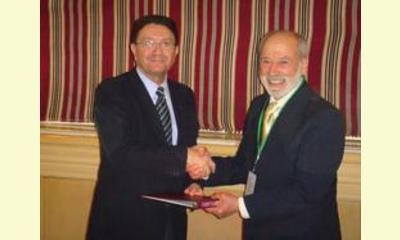|
|
IIPT and UNWTO to partner in peace through tourism
un articulo por International Institute of Peace through Tourism
The International Institute for Peace through Tourism (IIPT) is proud to announce that it has signed a Memorandum of Understanding (MOU) with the World Tourism Organization (UNWTO). The MOU provides for cooperation between UNWTO and IIPT in implementing activities and events related to tourism and peace in response to the needs and interests of UNWTO Member States, the international tourism sector and the international community, and to develop policy recommendations to enhance the role of tourism in the peace building agenda. . .

L to R: UN Secretary General Dr. Taleb Rifai & Louis D’Amore, IIPT Founder and President
click on photo to enlarge
UNWTO Secretary-General, Taleb Rifai, emphasized the potential of tourism in peace building and reiterated the important role of IIPT in contributing to a culture of peace. “Tourism can be one of the most effective tools in peace building, as it brings people from around the world together, allowing them to exchange ideas, beliefs, and different points of view; these exchanges are the very foundation of mutual understanding, tolerance, and human enrichment.”
IIPT Founder and President Louis D’Amore said: “We are most honored to enter into this MOU with the World Tourism Organization. UNWTO has supported the initiatives of IIPT since its founding in 1986 and has been a partner with us in major IIPT conferences and summits beginning with our First Global Conference in Vancouver, on through to our most recent 5th IIPT African Conference in Lusaka, Zambia. We look forward to the opportunities presented by this MOU and to further collaboration with UNWTO in promoting a ‘Culture of Peace through Tourism.’”
IIPT’s vision of peace embraces peace within ourselves; peace with our neighbors in the “global village”; peace with nature; peace with past generations – by honoring the traditions, cultures, and monuments they left as their legacies; peace with future generations – the core essence of sustainable development; and peace with our creator, bringing us full circle back to peace within ourselves.
IIPT achievements have included a number of firsts: first to introduce the concept of Sustainable Tourism Development (Vancouver Conference 1988) – four years prior to the Rio Summit; world’s first Codes of Ethics and Guidelines for Sustainable Tourism (1993) – one year following the Rio Summit; first international study on “Models of Best Practice – Tourism and Environment (1994); and the first legislation of any nation in the world on “Tourism in Support of the UN Millennium Development Goals” as a legacy of the 4th IIPT African Conference, Uganda, 2007.
IIPT conferences have produced a series of declarations including the Amman Declaration on Peace and Tourism officially adopted as a UN document, and most recently the Lusaka Declaration on Tourism and Climate Change, which has been broadly distributed. Other achievements have included broad distribution of the IIPT Credo of the Peaceful Traveler, Ambassador for Peace Awards for outstanding achievements in contributing to a “Culture of Peace through Tourism,” and a series of scholarships awarded to university students writing the best paper on the themes of our various conferences and summits. . .
|








|
DISCUSSION
Pregunta(s) relacionada(s) al artículo :
How can tourism promote a culture of peace?,
* * * * *
Comentario más reciente:
Why tourism?
Can tourism be seen as an instrument to achieve complicity between people’s minds?
“There is nothing better that connects two people’s mind than a good conversation” The above quote could be used to describe the effect which tourism has on people. Like a great conversation, tourism could be said to play a vital role amongst people all over the world. It fosters communication in all its senses, intercultural dialogue and mutual understanding.
In today’s world it is evident that there is a shortage of moral or ethical values amongst people across the different nations in this world, resulting in a globalised world lacking these morals and ethical values. Ignorance, the failure to consider the needs of others, and selfishness are a few of the ways which hinder us from embracing diversity and a common human perspective, which would result informal empathy, internal moral compassion, tolerance of differences, historical consciousness and interpretation. The above mentioned features are intrinsic, inherent and can be found in the practice of tourism.
Tourism has been emphasized as one of the most effective instruments which continue to tackle to tackle social and economical poverty, as well as encourage the culture of peace practice amongst people. In looking at the UN architecture, one is able to see the growing implications which the tourism sector has on the world and world policies. . ... continuación.

|
|









